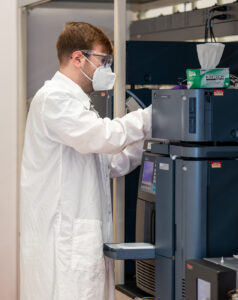Launched in 2020, the new Applied Drug Development master’s program in Pharmaceutical Sciences graduates its first-ever cohort
By Katie Ginder-Vogel
Working as a quality control specialist at Waisman Biomanufacturing, Nicolas Llano (MS ’21) was looking for his next step when he heard about the new Pharmaceutical Sciences: Applied Drug Development (ADD) master’s degree program at the University of Wisconsin–Madison School of Pharmacy.
Llano joined Waisman in 2016, after earning his undergraduate degree in biochemistry from UW–Madison, and was testing biologics for Phase 1 and Phase 2 human trials when he decided to enroll in the new program. He had been considering graduate school for a while, and the ADD program stood out because of its flexibility, quality, and curriculum.

He completed the 30-credit program on an accelerated schedule in August 2021, and since graduating, he’s gotten a promotion and has taken over Waisman’s high-performance liquid chromatography (HPLC) testing as the quality control HPLC lead scientist.
“I’m ecstatic — this master’s got me where I needed to be,” he says. “I’m glad my effort paid off. I don’t know if I would have gotten the promotion without the program.”
Llano is one of the program’s first four graduates, all of whom completed the program within a single calendar year, with the addition of a summer term.
“I was really impressed with our first graduating class and their hunger to learn about the science and about the skills to have a successful career in a pharmaceutical company,” says Associate Professor Eric Buxton, ADD program director and chair of the School’s Division of Pharmacy Professional Development. “Completing a master’s degree in a year is very impressive, especially considering most of our students are also working full-time.”
Designed for industry success
In addition to working professionals like Llano who enroll in the program to advance their careers, the coursework developed for the ADD master’s program is an option for students in the School’s Pharmaceutical Sciences PhD program to develop niche skills they’ll need to enter the pharmaceutical industry. The specialized curriculum also attracts students completing undergraduate degrees at UW–Madison in a STEM field with strong chemistry, biology, and analytical skills — such as graduates of the School’s undergraduate Pharmacology and Toxicology program — who want to complete a master’s in a fifth year before heading into the workforce.
The program was carefully designed in partnership with Wisconsin pharmaceutical companies to prepare graduates to enter the industry with robust, applicable skills. Developed by the School’s Pharmaceutical Sciences Division and Division of Pharmacy Professional Development (DPPD), with support from the UW–Madison Division of Continuing Studies, the curriculum incorporates training in skills and abilities needed to succeed in industry.

“We wanted to create a degree that was both useful to these companies and would get students jobs, and we tested this by talking with local companies and telling them what we envisioned for our degree program,” says Buxton. “They told us what basic skills they were looking for and helped us flesh out what the program should look like.”
Some of the courses were selected from the School’s existing Pharmaceutical Sciences graduate curriculum or related programs at the School of Medicine and Public Health, while new courses were also created with the help of industry experts, including alumna Jayne Hastedt (MS ’88, PhD ’90), managing director and founder of JDP Pharma Consulting, who contributed lectures and learning materials to a class about the drug development process. Other newly developed courses cover the intricacies of working in a regulated environment and laboratory and instrumentation methods, as well as project management.
“It was a really collaborative process between us and industry,” says Buxton. “Being told what companies were looking for in actual jobs helped us develop courses. Having that help to create the content really did the students a favor. These companies will be hiring our students.”
Getting the edge
As a full-time worker with an established career, Llano appreciated the flexible nature of the ADD degree.
“It was mainly online, which allowed me to continue working while I studied,” he says. “It felt like it was tailored to us.”
Llano’s classmate Trevor Zimmerman (MS ’21), a scientist with PPD, part of Thermo Fisher Scientific, says he appreciated the opportunity to learn about the industry from people working within it.

“Most of the instructors are experts within the field and provide great insight and knowledge,” says Zimmerman. “Additionally, courses included guest speakers who work in industry and provide expert information that aligns with the coursework.”
Like Llano, Zimmerman signed up for the program to provide himself with an opportunity to advance in his chosen career pathway and saw quick results.
“This degree helped lead to a promotion,” he says. “I was also able to explore more of my company through the internship opportunity.”
ADD students who were already working had the opportunity to take on new responsibilities, outside the scope of their existing role, at their current employer.
“It has really helped me understand my work and why it’s important,” Zimmerman says. “Having all this knowledge will help me better control my career and guide me to my goals.”
Evolving the program
With the first cohort of students officially graduated from the Pharmaceutical Sciences: Applied Drug Development master’s degree program, this is a time for the faculty and staff who designed and manage the program to reflect on lessons learned and ways to continue evolving the program for maximum impact.
Buxton says the program team — including Lindy Stoll, academic program manager, and Associate Professor Chuck Lauhon, associate dean for continuing studies — reviews student and instructor feedback at the conclusion of each semester and incorporates suggestions into the curriculum for the next cohort.
“[This degree] has really helped me understand my work and why it’s important. Having all this knowledge will help me better control my career and guide me to my goals.”
—Trevor Zimmerman
“We’re very happy with the results because we had high instructor and content evaluations,” says Buxton. “Students self-reported to us that they were getting promotions, even before they graduated.”
Buxton says he’s heard from the companies where students completed internships that they loved the quality of the students and would like him to keep sending them over.
“I’m happy to see that the students of this new program are succeeding so quickly, and I’m really proud of the faculty and instructional designer who created this program in one year,” says Buxton. “The high level of student satisfaction is a testament to the industry direction and hard workers in the UW–Madison School of Pharmacy.”